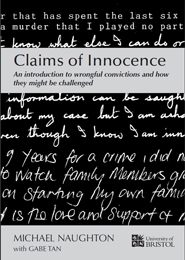Entitled Claims of Innocence, the book, which is available free of charge, describes how innocent people can be wrongly convicted, how the criminal appeals system can fail and even obstruct the overturning of convictions given to the innocent. It details how alleged wrongful convictions may be investigated and appropriately challenged, providing a six-stage methodology for such a task.
The book by Dr Michael Naughton, Senior Lecturer, School of Law and School of Sociology, Politics and International Studies (SPAIS), University of Bristol, is underpinned by a decade of academic work on wrongful convictions and practical attempts to overturn alleged wrongful conviction as part of his work with the Innocence Network UK and the University of Bristol Innocence Project.
Claims of Innocence looks set to make an impact as almost 3,000 copies were requested pre-publication by specialist criminal appeal lawyers and wrongful conviction victim support organisations based around the UK.
Mark Newby, Solicitor Advocate, Jordans LLP Doncaster; Director, Historical Abuse Appeal Panel (HAAP), said: “I am delighted to endorse this comprehensive book on wrongful convictions. In its clear and concise terms it will help readers start to grasp hold of a system which is overly complex and stacked against those who have been wrongfully convicted. The book will help all those who have suffered an injustice to have direction as they continue to fight to clear their names.”
Dr Andrew Green, Co-Founder of INNOCENT and United Against Injustice (UAI), said: “We, who have for many years tried to help innocent people in prison and their families to challenge the wrongful convictions of which they are all victims, have long felt a desperate need for a concise explanation of the appeals process and how prosecution cases might be effectively challenged. I and colleagues in innocent prisoner support and campaigning organisations welcome the publication of this book, which will be of great assistance to us and to prisoners and their families.”
Claims of Innocence will reach an international audience, too, as 500 copies have been sent to the Ohio Innocence Project at the University of Cincinnati for the delegate pack at the Innocence Network Conference 2011, that will bring together scholars, lawyers and exonerees from around the world together in one place to interact and learn from one another.
LexisNexis UK, a leading provider of legal, tax and business information and content-enabled workflow solutions, designed the book on a pro bono basis and donated the first 5,000 copies. The book will be distributed throughout UK prisons, and a copy of the book will also be sent to every sitting MP.
Tom Laidlaw, Head of Academic Development at LexisNexis, said: “We are pleased to be able to support the book in this manner as part of our commitment to support the 'Rule of Law' around the world. We often think of the ‘Rule of Law’ in terms of helping create a system of law or government in countries without clearly written and accessible laws or constitutions. However, even in mature democracies, the 'Rule of Law' still needs to be effectively upheld.”
Funding for the book, published by University of Bristol, ISBN 978-0-9561001-3-9, came from the first-ever award made by the University of Bristol’s Impact Development Fund.
